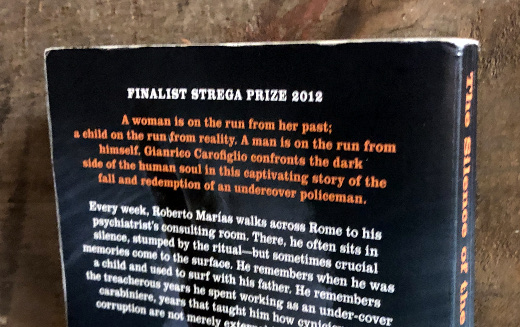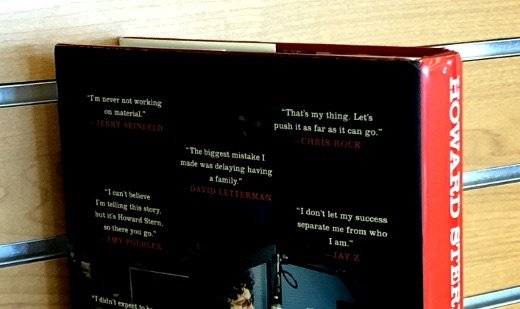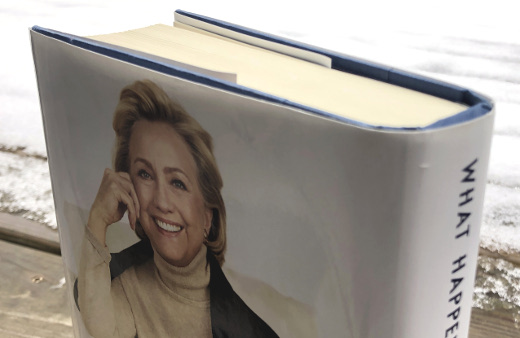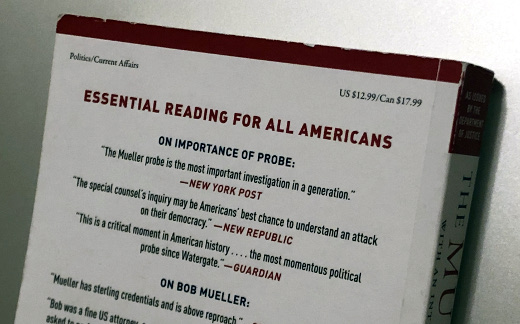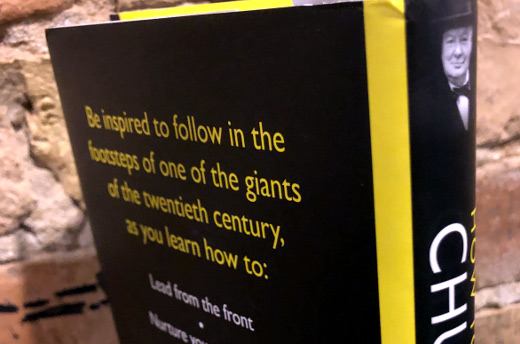My Takeaways From The Silence Of The Wave
When I sat down to write what you are reading now, I wasn’t exactly sure how to start it. I always try to write a clever opener, and after reading The Silence of the Wave by Gianrico Carofiglio, I thought that opener would have come a little more easily. Most of the books I read are business-related or guides of some sort, and I don’t read a lot of novels. Is this why I struggled with this?
As I write takeaways because I feel I am not the reviewer-type, I certainly had takeaways from this novel. It is a story of a former police officer in Rome, Roberto Marias, who treks across the Italian city each week to meet with his psychotherapist. Over the course of his visits he meets another patient of the doctor and a young boy, and the complexities of their lives become intertwined in his own, leading to a great plot twist at the end.
My takeaways are from the story and the book itself.
A translated novel can be engaging – Despite my 100% Italian-American heritage, I never learned Italian. It’s times like this, reading a novel translated from Italian to English, where I wish I could read and speak the language, so I could compare The Silence of the Wave in each language. That being said, the story was still compelling and enjoyable. I never read a translated work before, and I am inclined to do so again.
People need second chances – For reasons I won’t get into here to not spoil the plot, Roberto is no longer a police officer. Though he is not employed in his former career, he still thinks and acts like an officer of the law. Where he may not execute his former job completely going forward, there is no reason why he can’t be in a role where he can use his skills.
I need to read more novels – In a past takeaway I said this, but it has been a while since I have immersed myself in a long-form story, with the closest being issues of the literary magazine december I subscribe to. Even though I was stuck on the opening of this post, reading this story helped free my mind of how it usually processes thoughts.
The author Carofiglio has written other novels as well as a series of crime novels, and I am inclined to read others of his after reading The Silence of the Wave. Special thanks to Nick who sent me this book; I saw him post a write-up of it online, and when I asked him about the book, he dropped in the mail to me. Grazie Mille! As for who I will pass this along to, it is going to my Mother-in-Law, whom I hope enjoys it as much as I did.
This is from The Hot Iron, a journal on business and technology by Mike Maddaloni.
Did you enjoy this? Subscribe to The Hot Iron by RSS/XML feed or Read by Email
Book Take-Aways • (0) Comments • PermalinkMy Takeaways From Howard Stern Comes Again
When I got a copy of the book Howard Stern Comes Again for my birthday from my family last year, I was grateful but indifferent. Where I have always had respect for Stern’s accomplishments in radio and media, I was never a fan of his style. As I read his past 2 books, and was curious as to what this one was about, I dove into it. And I am glad I did.
This third book of Stern’s is a collection of segments from celebrity interviews he has done on his radio and satellite radio shows over the years, many of them in the last decade. I emphasize the time period for a reason, which will be a nice segue to my takeaways from this book.
Howard Stern has changed – The introduction to the book is 19 pages, which is the longest I have ever seen for an introduction. However it is necessary to paint the picture of the change in Stern’s life, from a health scare to going into psychotherapy. This is reflective in the more recent interviews in the book, where they are less sex-focused and less reflective of his narcissism and are now more insightful, both in the questions he asked and the responses of the celebrities he is interviewing.
Being real can be entertaining too – When I say real I don’t mean “reality” as in the faux-reality shows on TV like Survivor, but real as in conversation that appears on the surface as honest and, and as a result, real. Whether the celebrity responses were scripted ahead of time, who knows. But as I read through the interviews I actually enjoyed them, and that’s coming from someone who isn’t into celebrity interviews.
There’s sex talk too – It wouldn’t be Howard Stern if there was no talk about sex at all. But it’s not like I recall from hearing him in the past where he would open with questions like, “so what is it like to have sex with you?” This was a large part of my lack of interest in listening to him – it’s was raw for no reason other than being raw, and to me not entertaining. Then again, I have seen articles written about how Stern has gotten “soft” as he is now in his 60’s, so others are not a fan of his newer style as well.
If you are into celebrity interviews or just want some mind-candy, Howard Stern Comes Again is a book for you. It is a long book – over 550 pages and formatted in a multi-column format, and took much longer than I would have thought to read. If you’re not sure about whether to dive-in to the full book, the introduction alone is worth the read.
As I give away all books I read, this one is going to a great friend in Florida who is a devoted Howard Stern fan. Though he probably heard each and every one of these interviews, I am sure he will enjoy reading them as well.
This is from The Hot Iron, a journal on business and technology by Mike Maddaloni.
Did you enjoy this? Subscribe to The Hot Iron by RSS/XML feed or Read by Email
Book Take-Aways • (0) Comments • PermalinkMy Takeaways From What Happened
When Hillary Clinton came out with her book What Happened less than a year after losing the 2016 US Presidential election, I was on the fence as to if I wanted to read it.
Where I was interested in hearing her own story directly through her own lens and not through that of the media, I was also hoping this wouldn’t simply be a book of excuses for why she lost. Then I got the book for Christmas that year, and it went on the shelf awaiting to be read. Somehow other books piqued my interest more, but as the Special Counsel was appointed the investigation into President Trump and the White House began, it made sense to me to read What Happened.
Shortly into the 500 plus pages of the book I formed my takeaways from it, only to be reinforced as I turned from chapter to chapter.
All of what happened is in there – This is something I was hoping for –all of the reasons for why she won the popular vote but lost the Electoral College. Many times she brought up the email scandal and then FBI Director Comey as a primary reason. But among the pages she did admit that she should have gone to states like Wisconsin and Michigan, and even one line was in there that some people may not like her. As far as I am concerned, the book lived up to its title.
Insight into behind-the-scenes of the campaign – I have only been involved intensely with a political campaign and it was many years ago. There is a certain momentum and buzz about it, and many characters and scenarios as well. The story of Clinton’s 2016 campaign is told well here, in a voice and cadence that sounds like her own. My guess is some of this was written during the campaign, with some editing for how the results turned out.
Hillary Clinton will be the 2020 Democratic Nominee for President of the United States – She wanted to be President and I feel she still wants to be. Will she win? We’ll see.
What Happened was a good read, and that is coming from a non-partisan. Those who are strictly partisan will either love or loathe is book, depending on what “side” they are on. As I give away all copies of this book, I decided to leave it at a Little Free Library at a local storage facility where I have my extra stuff stored away. There have been some interesting titles there, and I may take one to replace this one on my shelf.
This is from The Hot Iron, a journal on business and technology by Mike Maddaloni.
Did you enjoy this? Subscribe to The Hot Iron by RSS/XML feed or Read by Email
Book Take-Aways • (0) Comments • PermalinkMy Takeaways From The Mueller Report
When the long-awaited report on Russian collusion in the 2016 election and obstruction of justice by the Trump administration, better known as The Mueller Report, came out, I was eager to read it. I had enough of the media and political spinning and wanted the information from the source, the Special Counsel’s office lead by former FBI Director Robert Mueller.
When I downloaded the PDF report from the Department of Justice’s Web site moments after its release, I was a little overwhelmed - it was over 400 pages, and I’d have to print it to read, as I certainly wasn’t going to read it on my phone or computer. Staring at the redactions that permeated the pages as I scrolled through it, I thought to myself there had to be a better way to read this.
That lightbulb over my head led me to Amazon, and to my wonderment I saw a couple of versions of said report, which just came out for pre-order. In one click I had added myself to a queue of unknown quantities of people who wanted to read the report the old-fashioned way.
The book, The Mueller Report, The Final Report of the Special Counsel into Donald Trump, Russia and Collusion, arrived a few weeks later, just in time for a work trip. But as I should have anticipated, this was no quick read - written by lawyers, why would it be? Plus I spent as much time reading it on flights as I did talking with people sitting around me, wondering about it as much as I was, so it took even longer.
Eventually I finished the 472 pages of the book, which was longer than the report as it included extra materials, such as the powers of the Special Counsel. The report itself was shorter than the original for instead of showing 33 redacted physical lines, for example, it just mentioned 33 lines were not included. My takeaways were mostly on the content with a little from the report itself.
Details on what was being called hacking – As someone who works in Web technology and social media, it was not enough for me to just hear there was “hacking,” for I wanted all the details of what was being called that. What was in the report satisfied that to a certain extent, listing accounts on Twitter and Facebook and what was posted and by whom. Where I wouldn’t necessarily call it hacking, I do believe there was a deliberate attempt to influence people. However as no analytics were presented with the account activity, it is open as to its effectiveness.
Michael Cohen was Executive Vice President of Trump Organization – In any press mention of Donald Trump’s personal attorney I ever heard, I never heard of his title in Trump’s business. I heard he was a personal lawyer, fixer, handler, bodyman and various other labels that were slang not to compliment him. Granted you can give anyone any title in your own business, but if EVP was his title, why did the media never use it?
The infamous Trump Tower meeting yielded nothing – There was a lot of talk about a June 9, 2016 meeting among Donald Trump Jr., Trump’s son-in-law Jared Kushner, then-campaign staff member (and later campaign chair) Paul Manafort and representatives from Russia. But after reading the testimonies from those in the meeting and what followed it, nothing came from it. Was their intent? That wasn’t even clear as it seemed like if there was to be some collusion, these weren’t the people capable of colluding!
Speaking of which, collusion wasn’t even considered – On pages 167 to 168 of the book it states, and I quote, “… this Office’s focus in resolving the question of joint criminal liability was on conspiracy as described in federal law, not the commonly discussed term ‘collusion.’” So all this time - years - and all of everyone saying collusion, and the label wasn’t applicable? And none of the TV talking heads who are lawyers knew that?
Richard Pinedo was jailed for fake bank accounts as a result of the investigations – There were other charges against others, but I heard very little about it in the mainstream media. One was Richard Pineda, who was sentenced to prison for providing fake identification information to the Russians who were running the “hacking” social media campaigns. Presumably this information was used to eventually make payments to social media sites like Facebook and Twitter for promoted posts. Perhaps information on Pinedo was released to the media, and they chose not to promote it widely?
Trump didn’t “recall” a lot in his responses – The book includes the written responses to questions sent to President Trump in lieu of live testimony by the office of the Special Counsel. Most of them began with “I don’t remember” or “I don’t recall,” all of which did not come as a surprise to me.
I got lost a lot in the second part – The second part of the report was focused on obstruction by President Trump and his staff. Much of this presented a case, then a very long description of the applicable laws and case laws that applied to the case followed by a conclusion. This was a difficult read for me as it consisted of so many legal terms, as well the phrasing of legal descriptions doesn’t exactly follow any rules of prose. As I am not familiar with any of these laws and case laws referenced, there was little meaning to reading the middle of each case, and as much as I tried not to, on occasion I skipped to the end.
If you are interested in hearing something from the horses’ mouth, as the phrase goes, I would recommend reading The Mueller Report yourself. Again it is not a quick read, and not always an easy one, but everything is in there in its source that has been translated by the media for the general consumers.
As I give away every book I read, I will give this one to the first person who makes a comment to this blog post. Don’t post your address, as I will follow-up with you outside of this. Note I have moderation on comments, and they will not appear right away. This offer is open to anyone, anywhere in the world. Make sure to follow the comments to see if you are the lucky winner!
This is from The Hot Iron, a journal on business and technology by Mike Maddaloni.
Did you enjoy this? Subscribe to The Hot Iron by RSS/XML feed or Read by Email
Book Take-Aways •
Strategize •
(0) Comments •
Permalink
My Takeaways From How To Think Like Churchill
Where I have always considered myself a history buff, I am by no means fully knowledgeable of all events in US and world history and their nuances. That being said, I am aware of most core events in US history, and of those abroad with a focus on the impacts here in America.
When I got a copy of How to Think Like Churchill as a gift from a relative, I was eager to read it. I was aware of Winston Churchill’s ascent to Prime Minister of the UK during at the time of World War II, his role immediately following the war and his love for cigars. But that was about it. My hope was this book would fill me in on the life and career of this pivotal world leader.
Fortunately this book lived up to my expectations, and then some. What went to and beyond my expectations were my takeaways from it.
I didn’t know about his earlier life – From being a soldier to a journalist to his early political offices, Winston Churchill lived a full life with a great breadth of activities. The majority of my knowledge of him begins with being UK’s Prime Minister following Neville Chamberlain and ends after World War II. This new knowledge of his upbringing, career and time in and out of office provides context to understanding who Churchill was and what he did.
Quotes and more quotes – I have known for years the quote, “If you’re going through hell, keep going” and that it was attributed to Churchill. After reading this book, which is sprinkled with his quotes throughout its pages, I learned many more of his famous sayings, as well as how he was able to sum up his thought process succinctly. Churchill would have done well today in the age of the sound bite and social media.
Soldiering On – To say Winston Churchill’s career bounced back from obscurity to be one the best known world leaders of the 20th century is an understatement. Personal loss, public defeat and challenges at home were just part of what plagued Churchill, but despite all of these he made a return unlike no other. The details of his challenges and his triumphs are nothing short of inspiring for anyone facing great odds.
How to Think Like Churchill is a small but mighty book at 203 pages. It’s larger than life subject made this an enjoyable read. The book is part of a series of “how to think” books on the likes of Steve Jobs and Nelson Mandela and is worth your pursuit whether you’re a fan of Churchill or other great personalities of history. As I give away all of the books I read, I left this one at the local coffee shop where I wrote these takeaways.
This is from The Hot Iron, a journal on business and technology by Mike Maddaloni.
Did you enjoy this? Subscribe to The Hot Iron by RSS/XML feed or Read by Email
Book Take-Aways •
Diversions •
(0) Comments •
Permalink

